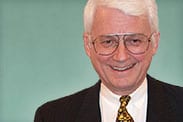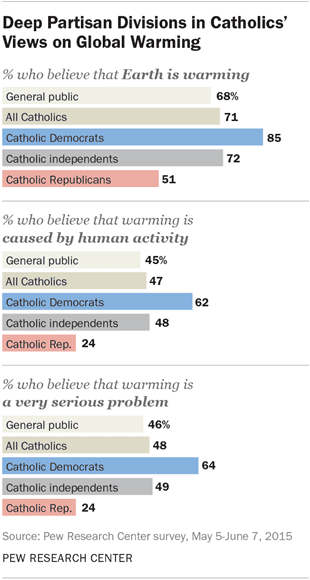Pope Francis’ forthcoming clash with global capitalism
Opinion: Pope Francis’s anticapitalist revolution launches on Thursday
[dropcap]M[/dropcap]ark your calendar: June 18. That’s launch day for Pope Francis’s historic anticapitalist revolution, a multitargeted global revolution against out-of-control free-market capitalism driven by consumerism, against destruction of the planet’s environment, climate and natural resources for personal profits and against the greediest science deniers.
Translated bluntly, stripped of all the euphemisms and his charm, that will be the loud-and-clear message of Pope Francis’ historic encyclical coming on June 18. Pope Francis has a grand mission here on Earth, and he gives no quarter, hammering home a very simple message with no wiggle room for compromise of his principles: ‘If we destroy God’s Creation, it will destroy us,” our human civilization here on Planet Earth.
Yes, he’s blunt, tough, he is a revolutionary. And on June 18 Pope Francis’s call-to-arms will be broadcast loud, clear and worldwide. Not just to 1.2 billion Catholics, but heard by seven billion humans all across the planet. And, yes, many will oppose him, be enraged to hear the message, because it is a call-to-arms, like Paul Revere’s ride, inspiring billions to join a people’s revolution.
The fact is the pontiff is already building an army of billions, in the same spirit as Gandhi, King and Marx. These are revolutionary times. Deny it all you want, but the global zeitgeist has thrust the pope in front of a global movement, focusing, inspiring, leading billions. Future historians will call Pope Francis the “Great 21st Century Revolutionary.”
Yes, our upbeat, ever-smiling Pope Francis. As a former boxer, he loves a good match. And he’s going to get one. He is encouraging rebellion against super-rich capitalists, against fossil-fuel power-players, conservative politicians and the 67 billionaires who already own more than half the assets of the planet.
That’s the biggest reason Pope Francis is scaring the hell out of the GOP, Big Oil, the Koch Empire, Massey Coal, every other fossil-fuel billionaire and more than a hundred million climate-denying capitalists and conservatives. Their biggest fear: They’re deeply afraid the pope has started the ball rolling and they can’t stop it.
They had hoped the pope would just go away. But he is not going away. And after June 18 his power will only accelerate, as his revolutionary encyclical will challenge everything on the GOP’s free-market capitalist agenda, exposing every one of the anti-environment, antipoor, antiscience, obstructionist policies in the conservative agenda. [Not openly opposed by Democratic politicians, but supported behind closed doors, Obama-style.—Eds)
Just watch the conservative media explode with intense anger after June 18, screaming bloody murder, viciously attacking the pope on moral, scientific, economic and political grounds, anything. But most of all, remember, under all their anger, the pope’s opponents really are living in fear of what’s coming next. What’s dead ahead.
If the Pope’s hostility to capitalism—and his denunciations thereof—are regarded as serious, the propagandists will be quickly mobilized en bloc to assassinate his character. Prominent among these, wittingly or unwittingly, and certainly tragically, will be many gays and feminists, since the Pope continues to uphold retrograde views in those areas.—Editor.
Here are eight of the pope’s key warning punches edited in the Catholic Climate Covenant, from his “Apostolic Exhortation,” and in London’s Guardian and other news sources, warnings on the dangerous acceleration of global-warming risks to our civilization and the environment, along with our responsibility to “safeguard Creation, for we are the custodians of Creation. If we destroy Creation, Creation will destroy us.”
For Pope Francis, there’s no room for compromise, and his enemies know it. Listen for his warnings to be expanded in his encyclical on June 18:
1. Capitalism is threatening the survival of human civilization
A “threat to peace arises from the greedy exploitation of environmental resources. Monopolizing of lands, deforestation, the appropriation of water, inadequate agro-toxics are some of the evils that tear man from the land of his birth. Climate change, the loss of biodiversity and deforestation are already showing their devastating effects in the great cataclysms we witness.”
2. Capitalism is destroying nonrenewable resources for personal gain
“Genesis tells us that God created man and woman entrusting them with the task of filling the earth and subduing it, which does not mean exploiting it, but nurturing and protecting it, caring for it through their work.”
3. Capitalism has lost its ethical code, has no moral compass
“We are experiencing a moment of crisis; we see it in the environment, but mostly we see it in man. The human being is at stake: here is the urgency of human ecology! And the danger is serious because the cause of the problem is not superficial, but profound: it’s not just a matter of economics, but of ethics.”
4. Capitalists worship the golden calf of a money god
“We have created new idols. The worship of the ancient golden calf has returned in a new and ruthless guise in the idolatry of money” … Francis warns that “trickle-down economics is a failed theory” … the “invisible hand” of capitalism cannot be trusted … “excessive consumerism is killing our culture, values and ethics” … and “the conservative ideal of individualism is undermining the common good.”
5. Capitalists pursuit of personal wealth destroys the common good
Without a moral code, “it is no longer man who commands, but money. Cash commands. Greed is the motivation … An economic system centered on the god of money needs to plunder nature to sustain the frenetic rhythm of consumption that is inherent to it.” Instead, the pope calls for a “radical new financial and economic system to avoid human inequality and ecological devastation.”
6. Capitalism has no respect for Earth’s natural environment
“This task entrusted to us by God the Creator requires us to grasp the rhythm and logic of Creation. But we are often driven by pride of domination, of possessions, manipulation, of exploitation; we do not care for Creation, we do not respect it.”
7. Capitalists only see the working class as consumers and machine tools
“Nurturing and cherishing Creation is a command God gives not only at the beginning of history, but to each of us. It is part of his plan; it means causing the world to grow responsibly, transforming it so that it may be a garden, a habitable place for everyone.” Everyone.
8. Capitalism is killing our planet, our civilization and the people
Pope Francis warns that capitalism is the “root cause” of all the world’s problems: “As long as the problems of the poor are not radically resolved by rejecting the absolute autonomy of markets and financial speculation and by attacking the structural causes of inequality, no solution will be found for the world’s problems or, for that matter, to any problems,” as environmental damage does trickle down most on the world’s poor.
Pope Francis’ historic anti-capitalism revolution is divinely inspired
Imagine Pope Francis addressing a hostile GOP controlled joint session of the U.S. Congress in September. There’s no chance of changing the minds of those hard-right politicians, all heavily dependent on fossil-fuel special-interest donations. But he’s clearly laying the groundwork for a global revolution, and his enemies know it.
And watch the ripple effect, how his historic “Climate Change Encyclical” adds fuel to the revolution after Pope Francis addresses the UN General Assembly … how the revolution picks up steam after the UN’s Paris Climate Change Conference announces a new international treaty approved by the leaders of America, China and two hundred nations worldwide … how the revolution kicks into high-gear after the pope’s message has been translated into more than a thousand languages … and broadcast to seven billion worldwide, billions who are already directly experiencing the climate change “evils that tear man from the land of his birth.”
Bottom line: Given the global reach of his encyclical, Pope Francis’ revolution will accelerate. So the GOP’s 169 climate deniers, Big Oil, the Koch Empire and all hard-right conservatives better be prepared for a powerful backlash to their resistance.
Pope Francis’s 2015 war cry is to lead a global anticapitalist revolution, a revolution leading billions to take back their planet from a fossil-fuel industry that’s lost its moral compass to the “golden calf” and is destroying its own civilization on Planet Earth.
ABOUT THE AUTHOR

[box] Paul Farrell writes the column on behavioral economics. He’s the author of nine books on personal finance, economics and psychology, including “The Millionaire Code,” “The Winning Portfolio,” “The Lazy Person’s Guide to Investing.” Farrell was an investment banker with Morgan Stanley; executive vice president of the Financial News Network; executive vice president of Mercury Entertainment Corp; and associate editor of the Los Angeles Herald Examiner. [/box]
ADDENDA
[printfriendly]
Remember: All captions and pullquotes are furnished by the editors, NOT the author(s).
What is $5 a month to support one of the greatest publications on the Left?





